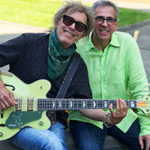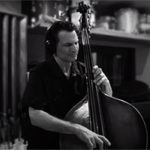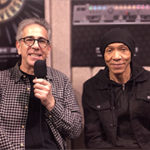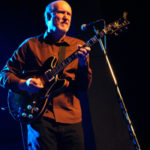12-string bass maestro speaks about his studio career, instrument choices, and friendship with Steve Swallow
Exclusive interview with FBPO’s Jon Liebman
March 1, 2021
A respected session musician in the New York City music scene, Tony Senatore has made a name for himself as a master of the 12-string bass. With decades of experience under his belt, the bassist and composer has served as house bassist for both The Barber Shop Studios and Visionary Sound Studios in New Jersey. As a band member, he’s played in the groups of pioneering rocker Genya Ravan and Jersey blues man Billy Hector. Senatore has been featured in numerous industry publications, including Mike Varney’s “Spotlight” column in Guitar Player magazine. In 1991, he recorded as a sideman with virtuoso guitarist Stephen Ross on Midnight Drive, an album released by Varney’s Shrapnel Records label. Senatore released his solo debut, Holyland in 2005.
FBPO: I know your father played a big role in your initial exposure to music. Tell me about those early days.
TS: He did. He was a trumpet player, and he played with Tito Puente. I actually started on the trumpet when I was maybe 5 or 6 years old. We all, to a great extent I think, end up doing what our parents do. We’re very influenced by our surroundings. My dad played the trumpet, so naturally, I wanted to be like my father. He happened to have a trumpet lying around, so he started showing me a couple of things. He was pretty well-known in the New York area. He started sending me for lessons at a very young age with a guy by the name of Lew Soloff. I’m not quite sure if you know how he is.
FBPO: Of course. Blood, Sweat & Tears.
TS: Lew was a very good friend of my dad’s. He was teaching me at a young age, and I was hitting these super high notes for some reason. Lew was like, looking at my lips, saying, “How you doing this, man?”
FBPO: Oh, that’s great!
TS: But my dad also had a bass guitar lying around the house, and when I was about 16, I started plucking around on it. And I don’t know what it was, but it resonated with me. I just liked that feeling of hitting that one low note and feeling that fat sound, you know?
FBPO: I do.
TS: So I started moving away from trumpet. It was clear I really wanted to stay with the bass, and my dad was disappointed. You know, he thought he was grooming me to be a trumpet player, and here I am playing the bass. But he didn’t really prevent me from doing it. He actually helped me.
FBPO: Who were your bass influences once you discovered the instrument?
TS: Well to tell you the truth, the first guy that really made me want to play the bass was a guy named Kenny Passarelli, who played with Elton John. I went to see them at Madison Square Garden in 1976. I love Elton John to this day, and when I saw that band with Kenny in it, I said, “This is what I want to do.” I went into high school knowing I wanted nothing to do with a career in music, because my dad was away all the time and traveling. I was more scientific minded. I loved to play, but I didn’t want to make it a profession. Once I saw Kenny and I saw that band…
FBPO: Was Dee Murray on your radar too? Was he one of your influences?
TS: Absolutely! Without question. I mean, once I heard Kenny, I went back and I listened to the older stuff. And Dee was just, to this day, he’s one of those guys… I’m sure you do the same thing where you were influenced early on by certain people. Then as you get older and more accomplished, you revisit them to see if they live up to what you thought. And he sure did for me. Even more so.
FBPO: Anybody else?
TS: Back then, absolutely, there was a ton of people. Once I got going, it was probably another tremendous influence who turned out to be a very close friend of mine as a guy by the name of Peter “Mars” Cowling from the Pat Travers Band. He was on the Travers Go For What You Know Live LP.
FBPO: What got you interested in the 12-string bass?
TS: Well, that’s a great question. When I got into the “Spotlight” column with Mike Varney, I played four-string bass like everybody else. I felt obligated to at least start investigating some of these new things that were happening at the time. The 6-string bass, for instance, was pretty new. Anthony Jackson, John Patitucci were playing that in the mid ‘80s, so I figured I should maybe jump on it to at least keep current. One day by chance, I was in a music store in New Jersey, and they had a 12-string Hamer bass. I knew what those were because of Cheap Trick. On Cheap Trick Live at Budokan, Tom Petersson’s playing the 12-string. And even as a young kid, you kind of heard that that was a unique aspect of that music. I didn’t really know exactly how, but if you listen back, you hear it’s definitely not a bass guitar. It’s something different.
FBPO: It sounds like that was a real turning point for you.
TS: Once I picked that thing up, that was, I would say, the start of my real career. Even though I’d been playing live and doing stuff since 1980, it wasn’t until I picked up that instrument that people started to care about what I was doing. It took a multi-stringed instrument for me to find my voice. Petersson plays it. He’s the guy who actually invented the instrument with Hamer, and he played it with a pick. And then the bass player in King’s X, dUg Pinnick, doesn’t play it a lot, but he plays it. I remember going to see them in New Jersey. And when he walked onstage, people freaked out. Because it’s like, it’s kind of cool looking. I play it with my fingers, and those guys play it with a pick. Another thing about me is I’m not one of these guys that are anti-pick. I love guys that play with picks. I wish I played better with a pick. It’s something I’m trying to work on.
FBPO: Your association with Steve Swallow is obviously very special. Talk to me about that.
TS: Very special to the point where it’s one of the things that sustains me when I think about it. For some reason, at least in my case, of a lot of guys I know, they’re compelled to, when they meet their idols, to tell them that they matter to them and, “It was because of you that I picked up the bass.” You know, just to let them know they’re important. Well, early on in my career, I met a lot of bass players that I looked up to. And I got to say, honestly, when I met pretty much every single one of them, I was left feeling very cold in that there was not really much interest in me or anything I might say. I mean, they were very self-absorbed, and it was very frustrating.
FBPO: Until…
TS: Until I met Steve Swallow. Everything completely changed at that point. I had just put out an audio CD back in 2005. It was called Holyland, and I was using this 12-string bass. Then I put out a DVD in 2007, which is like, sort of my instructional video on the 12-string. And so, I sent them both to Steve. I found his address through the Musician’s Union in New York City, believe it or not! I sent them to him in hopes that he might be different from the others. And sure enough, he sent me back the most terrific emails, which I still have saved to this day, about what I was doing and what he thought of it, and to keep going. He was very nurturing.
FBPO: That’s beautiful.
TS: So from that point on, I sort of became friends [with] him, in that we talked about all sorts of stuff. Not just music, but poetry. Probably the brightest musician I’ve ever come across. Super, super smart guy. But more importantly, he’s a great guy. He’s a nice guy. I used to go to the city when I was out of high school, like in 1980. And he used to be with John Scofield at the Village Gate. I used to just sit there in awe watching him. And then here I am, 18 years later, he’s sitting next to me playing. He inspired me to continue to try to be creative. And he was receptive to the fact that he was very influential to me. Those type of things don’t pay my bills or his, but to me, that’s everything. That’s it. A young guy looks up to somebody, and then that older guy gives him inspiration to continue.
FBPO: Tell me more about your gear.
TS: I’m the biggest vintage gear guy ever. I’m insane! In a day where people buy Line 6 modeling pedals, I’m the guy that brings the actual amp into the studio. I’ve been amassing an incredible collection of stuff. I have my bass amps [including] an SVT, an Acoustic 360, a Ampeg V4, a V15, V18. I have all the greatest bass amps ever made in storage. And I have maybe about 30 or 40 bass guitars, which I accumulated since 1980, when you could buy the want ads and find a Fender for $300. It was very easy to accumulate as much as I have in the time I accumulated it.
FBPO: I’m guessing that, even with that many basses, you still gravitate to the same two or three all the time. Is that true?
TS: It’s true, it’s true! People always ask me, the big question, “You have 40 basses, if you only could have one, which one is it going to be?” And the answer to that for me is my Fender Precision bass that I learned on, because I know that it works for everything. Of course, other instruments work, you can play a lot of stuff, but for me and my experiences, when I went into the studio, the Fender always worked. Especially the Precision.
FBPO: What kind of strings do you use?
TS: My honest opinion is, all the major companies are quite good. But I’ve been working with Ernie Ball, and I’m using the Cobalt flats. I love them a lot. Ernie Ball Cobalt Flats are pretty much the strings that I use all the time. They’re just terrific. Of course I use rounds as well. They make everything, but I’m also a guy that uses strings that most consider are too heavy. I use like, a .110 E string. That’s heavy, but I’m a heavy-handed guy. I’m a guy that learned how to play in the ‘70s, when you didn’t have powerful amps, so you had to really belt it out with your right hand, you know.
FBPO: What’s keeping you busy these days?
TS: Wow, that’s a great question! And I’ll be totally honest. Rather than be a musician that doesn’t like to tell the world that they’re doing something else, other than music, I want to be the guy to say that I’ve been doing an unrelated-to-music job since 2008. I have a day job. I work in, believe it or not, a government wastewater facility. I’m an essential employee there, so I’ve been working since the first days of the pandemic, without interruption in pay. I know all the greatest players in the New York area, and I feel so bad because the business wasn’t good before the pandemic. It was terrible. It’s not getting better, and so now, people have to really think about how they’re going to survive.
FBPO: What about the future, as far as you can see? Is there anything else you want to do that you haven’t done yet?
TS: I’ve been working through this pandemic, from the time it started. I’ve been working with a bunch of guys recording videos remotely, like everybody’s doing. Everybody’s doing their own thing at their own place. It’s really not about making money. Maybe at some point, when we have about 10 things finished, we will actually play live and people will know. It’s so difficult now to monetize digital stuff. It’s really tough. We’ve already made four videos. The fifth one is on the way. We just release them on YouTube and other bass sites and stuff like that, and we’re just trying to get some attention. You know, like the opposite of what you used to do.
FBPO: What do you think is important for somebody to know if they want to learn to play bass?
TS: I would say music for a lot of people should and could be something for their own personal enjoyment. They don’t necessarily have to know all the modes, and how to read, and work on their ear training. Those are the things that, if you want a career in music, they’re never going to go out of style. Those are skills that all musicians should strive for. But for the people that just want to have fun, it’s about not worrying about stressing out about playing fast or even reading. If you know the tools, if you know how the songs are constructed, then you can figure it out for yourself.
FBPO: What would you be if you weren’t a bass player?
TS: That’s very easy. I would be a doctor. That’s what I actually always wanted to be growing up. I just got bit by the music bug, and it took me for a long time. Musicians make people happy. And to some extent, they’ve actually influenced the course of the world with their activism and songs and stuff like that. However, to me, if you’re a doctor, you really can be hands-on in making a big difference. So that’s what I would be. And my second thing that I would be, which is actually what I went back to school for, is to simply be a teacher in an elementary school or a high school. I think teachers are the most important thing in American society, your standard, regular teacher in a public school. We need better teachers, and we need to have more respect for teachers. So, doctor and a teacher.
See Jon’s blog, with key takeaways from this interview here.





